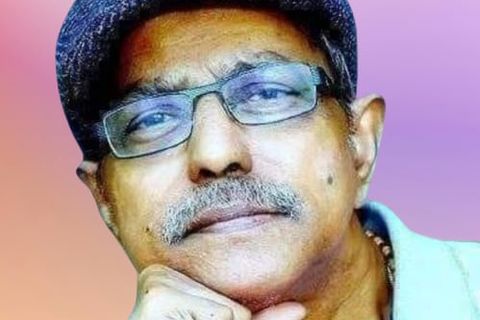PERIYAR

ONE
PERIYAR
Media men based in and around Kochi in Kerala State in India will sure be worried about the sudden floods only when it rains followed by river Periyar overflow. Until then, we will not look back at what is going on in the city vicinity and its backwaters
When there is a drastic flood we will search for the cause of it and we will catch people who have recently come to Kochi from distant lands and live in flats and put them in front of the channel's mike. Because those who came yesterday know clearly how Kochi used to be and what was the real cause of the flood!! When I heard him commenting in front of the mike that there was no flood like this in Kochi in the last sixty years, the matter became even clearer!!!
In fact, in the 70s, there was never even a nominal flood in Kochi until the 70s (let alone the great flood of 1341. Kochi never happened then) I don't know if any of the academies teach it in today's diploma courses. Until the 70s, Kochi and its suburbs were seen today as just a single inland village. Apart from the harbor and the old railway station, the tallest in Kerala at Kayaloram, the seven-storied Sealord, the rare double-storied buildings, the market, broadway, market boats, bullock carts, and so on, 95% of today's Kochi city is a village of vast paddy fields, full of fruit trees, full of well-flowing streams, canals, swamps, wetlands, ponds and backwaters, and rivers. The land where as much rain as falls gets into the soil and the rest flows without any hindrance into rivers, lakes, and fields. Today's MG Road. until the first half of the seventies.
The golden paddy field was growing in abundance right next to the MG road. It was a time when it rained non-stop for months. Still, there was no flood in Kochi that day. How come today Kochi is submerged in water just by a single rain that lasts for hours? Especially when it's full of canals and repeatedly costs billions to build and maintain it? Aren't there some reasons for the recurring floods here since the eighties? Why is it not sought, not told, not exposed, when is it not for the flood?
Menstrual cups are now more important to us than water reservoirs. Campaigns that highlight its strengths. In that case, we can discuss sitting high in the metro. What happened below, how we lay down, our interests are always at the height!!! Let it stand there for now. Let me tell you a story from the seventies. The story of the early seventies. Kochi, where today's shipyard is located, was a very beautiful village back then. To the east of it (Seventy Feet Road) are paddy fields, streams, swamps, and wetlands where Pokkali rice grows abundantly. How many times have you seen these fields full of beaks... The railroad tracks that we see today run through the middle of it, that too at a height. All the water that fell on that day flowed without any hindrance into the aforementioned paddy fields, creeks, marshes, wetlands, and then into the rivers. In the 1970s, Girinagar, then Gandhinagar, and Panambilly Nagar were filled one by one. And then around it would be oceans of buildings, above and below the ground, without any regulation or planning seen today. Then, where will all the water that falls fall and flow through which ways... The answer to that question is the miseries of waterlogging that the reference area has experienced since the 80s till yesterday and is yet to experience. If there were any means left for the water to flow away, they are now all topped by buildings. Those with money and influence grabbed it all. There has been no shortage of that in Kochi till now. No hawk flies over money. If there was any soil left, it was covered with tar and tiles. When the rich did this, the poor found a place to sleep and the water flow was on the way. Right in front of the shipyard, opposite the road, there was a very wide promontory extending south to the river, where boats used to go up and down, until the seventies. The stream where all the rainwater had flowed away was full of fish playing. In the early 70s, dozens of houses came up in that stream itself. The encroachers first built houses over the water. Then the ditch was filled and houses were built. Then the water through it to flow.. This is exactly what happened in Kochi after the 70s. Then through which route will the water flow... If there are crores of money that have been shared in various tributaries in Kochi in the name of avoiding waterlogging till now, maybe a state can buy a ban. So my friend let's sit upstairs and meditate on the cup of life!!! (Cont...)
*****
STARTING OF CHAPTER ONE
Opening her overslept eyes to the coolness, Ramya looked around. It was dawn. Their sun faded after a few hours. There was no one in the next room. She got up hastily and walked to the kitchen. Shymala was sitting at the dining table and sipping her coffee slowly, Ramya sat next to her.
“ We have already grabbed an exclusive interview for our new channel with famous Viswanathan Sir “. Please arrive here at the office early in the morning itself. I have not slept since I started reporting the news of yesterday's political issue of a murder, it is a non-stop run.”
She is the one who wakes me up before the alarm almost every day. It is not surprising that she herself got the first interview of the warrior who informed the people of every pulse of the revolution. The editor himself says about her as “the boldest investigative journalist” .
“Why are you making my innocent child stand in the rain even after his death? I don’t close the door. Let the rain lash inside and drench me. Let at least my invisible son know that his father never shut the door,” Warrier, a retired Hindi professor, writes in his book, ‘Memories of a Father’, describing why he could not give up his struggle until the police admitted they had killed his son.
*****
Please arrive here at the office early in the morning itself. I have not slept since I started reporting the news of Ramya Revolution, it is a non-stop run. He took a shower early in the morning and went outside. The ripples of revolution have not yet begun to affect the city. Otherwise, Kochi is less open to such matters. This city is like an old family gathering that brings together the in-laws from many homes. Kochi knows how to sort out and embrace change. In the country, this would have been the main topic of conversation in tea shops and buses. But only tea is grown in the tea shops here.
Kochiknows how to sort out and embrace change. In the country, this would have been the main topic of conversation in tea shops and buses. But only tea is grown in the tea shops here. Ramya has reached the office. The party is working on the final phase of the interview questions. "Morning Sachi... He said to meet at 10 o'clock. On MG Road. He has other events today." "Let's go to the metro, Ramya. Or
we'll be late".
Ramya, who has written extensively about Kochitraffic, which is measured by distance and time, agreed. After downloading all the old photos from the camera, we walked to the metro station, took the ticket to MG Road, and got on the platform. There are 5 minutes left for the next train. There is a lot of rush today. Kochi metro is now operational. People reluctantly discipline themselves from within. Ramya and I stood in the less crowded two rows. When I saw the people standing in a row, I remembered playing the train as a child.
I always used to lose my trousers while running, so when I stopped for the assembly at school for the first time, I laughed as I held on to my trousers which were about to come off, thinking it was to play train. When the countdown reached 0 on the display, the train reached the front. People started running like stones thrown into an anthill. As the seat was full, we faced each other slightly away from the door. If it wasn't for Ramya, I would have quit this job earlier. It is because of her that she does not have to run behind hot and sour stories like in regular online dailies. Anila has great respect for her.
The train reached MG Road after ten minutes. By the time I got down, Viswanathan's phone rang. Pulli couldn't escape the grip of traffic like us, the poor thing was not given a green signal somewhere outside the reach of the metro. I have never seen a single photo of Pulli, although he is known and known, and I have read Ramya's report that he is from Tamilnadu and is a senior in Texas Instruments. We walked to the Metro Art Center called Puli Prabhakaran, envisioning people from Rajinikanth to Vijaya Sethupathi and Veerappan to Puli Prabhakaran in our minds.
Even in the cultural center, the busiest part of Bangalore, Ramyapati shrunk to the phone solemnly. Glancing at the murals, I also looked up Ramya's report "The Story of the Black Revolution" on my phone. The story of the black revolution "Would a normal football match between two clubs turn into a big revolution that would move the two sides of the world?... The game between the two leading clubs
in France. This is what is happening after 90 minutes. Perhaps if there is a world war tomorrow, historians will record it as the beginning of the July Crisis.
After the second World Cup victory, the leading domestic football league in France begins with a derby between the two leading clubs in France. Among these, the Paris giants are the current champions and played a crucial role in helping France win the World Cup. The next team is lyon fc and the horses who are coming to regain the lost crown. After many years, the league derby is coming to France. All other teams were far behind in the race for the Paris giants. But this year Lyon was taken over by a big Arab business and brought in big players. Therefore, the fans of both teams gathered at the stadium in Paris to see the fire in the fight this time.
Another attraction in this contest was Muhammadu Buhari, the new dawn of France. The best emerging player in the last World Cup.Usainbolt's speed and Messi's agility in the feet of the African magician. Buhari's family migrated from Nigeria to France. It was the African strength of people like Buhari who immigrated to France that won the last World Cup. It was in Ekaru that the giants collected their crowns. So the day of the competition came. The games started witnessing a packed stadium. As expected, the Parisian giants dominated the game from the start. Before the end of the first half, the team took the lead with beautiful goals. So all good till the first half.
But everything turned around in the second half and Lyon hit back. Competed. Not long after, the giants got a penalty in their favor. It was Buhari who came to take the penalty. Buhari took the shot with complete confidence and flew up past the goal post. The stadium was silent for a moment. Many could not believe their eyes and looked at the big screen to confirm the reality. Buhari, on the other hand, is left alone in the playground like a soldier who has lost his weapon. Every moment that followed was one Paris team didn't want to remember. Leonteingol rained down on the advance he got without stopping. At the final whistle of the match, the Paris team had lost. For the first time, they bowed down to their neighbors in humiliation.
All of their anger was directed at Buhari, who scored the penalty. His fans called him the loner. Newspapers wrote that class love was shown in front of the Arabian capitalist. GoBack to Africa boards and hashtags are down. This was taken as an opportunity by radical nationalists, who were rioting because the refugees were making the city dirty, and the locals attacked the African refugees who had settled in the city of Paris for losing the competition. Finally, under pressure, the giants management decided to bench Buhari and other African players for the next match.
The strikers declared that not a single African would be allowed to watch the next match. This was a common occurrence in Europe, where anti-immigration protests are taking place, and the phenomenon of players who only become natives when they win and refugees, when they lose, has also been seen a lot. But that game changed everything and there was an explosion in the stadium where the match was taking place. Native worshipers were killed. Game stopped. The French world was shaken by the sudden attack. The media wrote that the refugees began to act selfishly and bit the milkman's hand. They warned that Paris would be under the control of ISIS if it was too late. In Parliament, both sides argued that the immigrants should be resettled. A man was sitting in Africa watching all this. David Kagma, President of Rwanda. The best leader from Africa since Nelson Mandela. He had not long assumed power as the head of the African Nations, which is currently the confederation of African nations, and Kagma, who had always dreamed of Africa's resurgence, recognized this as a golden opportunity.
He invited Buhari and his comrades to Africa and called on them to be ready to fight with black people all over the world. The news was reported by the media around the world as... "A new world revolution is born... Africa's revolution or black revolution"..... Viswanathan came to end our long wait. And so we first saw the Indian hero of the black revolution. Viswanathan in front of me was different from all the previously conceived hero figures. In appearance, he was like any other ordinary person, a man with nothing special to distinguish him from the crowd. But in speech, he is certainly a leader with a strong voice capable of leading any crowd.
All our greetings and introductions were in English, but soon the conversation shifted to Tamil, especially between Ramya and Viswanathan. Otherwise, it is the most appropriate language for the revolution. "Utalmannuk... Uirtamizhuq". Both of them discussed the days and future of the revolution. His countenance was clear-eyed when he spoke of the Indian possibilities of the revolution and clouded when he spoke of its reception so far. I captured everything on camera. All Ramya's questions had answers in Viswanathan's hands, in other words, the answers were born before the questions and were waiting for the questions. Today they all got freedom. Considering Viswanathan's busy schedule, Ramya shortened the interview. We parted, saving further questions for the next meeting. After returning to the office and sending all the photos in my hand to Ramya, I went down for the others. Ramya then had half of the report ready. Viswanathan's exclusive interview was out by the time people gathered to eat the regular tea and pazampori at the Malayalee tea shop in the evening. The leader of the black revolution..An exclusive interview with Viswanathan. Arvind Kejriwal, Hardik Patel, Jignesh Mevani, Kanhaiyakumar.. These are all the names active in the news recently. All of them are famous because of the struggles they started.. Revolutions and struggles create a leader. A recent addition to Anira from South India. . Viswanathan.
Viswanathan is a name we have been hearing since the black revolution swept the world. The Indian leader of the revolution started by David Kaga. Who is Viswanathan? What is the relevance of the black revolution in India?.. There are so many questions around us. No one to answer that... Viswanathan... # The first question is who is Viswanathan? What is the only qualification to be the leader of a world revolution? NamViswanathan. He is an employee of a leading electronics company. Here in KochiI am a Tamilian. In Delhi I am Madrasi..when I go out I am Indian... but everywhere here I am black.. that is my first mark... that is my greatest qualification to be a fighter of this revolution.. # Are white people that dangerous?



